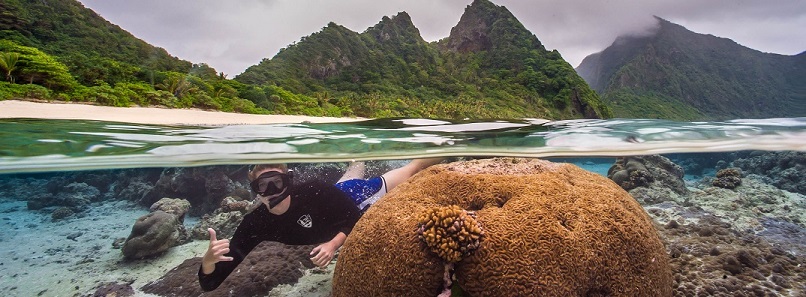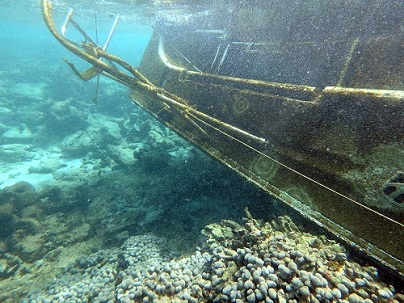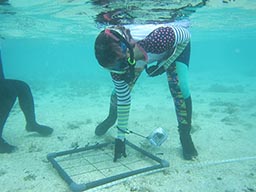- ABOUT US
- PROGRAM AREAS
- CONSERVATION APPROACH
- EDUCATION
- MULTIMEDIA
The Value Coral Reefs Provide against Hazards

In April, the U.S. Geological Survey released the results of a study on the role of coral reefs in reducing coastal hazard risks. The report, titled “Rigorously Valuing the Role of U.S. Coral Reefs in Coastal Hazard Risk Reduction,” looked at tools, valuation approaches, and economic information from various federal agencies. The study determined that U.S. coral reefs protect over 18,000 Americans, more than $825 million in coastal infrastructure, and nearly $700 million in economic activity from flooding every year.
Coral reefs are integral to protecting lives, livelihoods, and economies along the nation’s coastlines. The total economic value of coral reef services in the U.S., including fisheries, tourism, and coastal protection, is more than $3.4 billion annually. NOAA’s National Marine Fisheries Service estimates that the annual value of U.S. commercial and recreational fisheries dependent on coral reefs is $100 million each. Coral reefs protect lives and property by absorbing 97 percent of a wave’s energy while buffering shorelines from currents, waves, and storms. The U.S. is one of the top 10 countries worldwide that benefits from coral reefs in terms of risk reduction.

The study results are supportive of activities by NOAA’s Coral Reef Conservation Program and partners to restore coral reefs following storms, vessel groundings, disease, and other coastal hazards. The program is a leader of the response team for the stony coral tissue loss disease in Florida; response activities include treating individual coral colonies that have the disease, investigating possible pathogens, and salvaging specific coral species to prevent the loss of diversity in the ecosystem. The team is also sharing information and lessons learned with the U.S. Virgin Islands, where a similar disease outbreak has been identified.
The Coral Reef Conservation Program has also assisted with initial assessments and emergency restoration efforts after major storms, including Hurricanes Irma and Maria in the Caribbean and Typhoon Yutu in the Pacific. The program recently assisted with the first-ever FEMA-funded assignment to assess and rescue corals in Puerto Rico and developed actions for Puerto Rico’s Disaster Recovery Plan.
NOAA, the U.S. Geological Survey, and other agencies and organizations will continue to learn more about the economic value of coral reefs and subsequently use that information to restore coral reef ecosystems that benefit both the environment and the U.S. economy.
Related Stories and Products
About Us

The NOAA Coral Reef Conservation Program was established in 2000 by the Coral Reef Conservation Act. Headquartered in Silver Spring, Maryland, the program is part of NOAA's Office for Coastal Management.

The Coral Reef Information System (CoRIS) is the program's information portal that provides access to NOAA coral reef data and products.
Work With US
U.S. Coral Reef Task Force
Funding Opportunities
Employment
Fellowship Program
Contracting Assistance
Graphic Identifier
Featured Stories Archive

Access the archive of featured stories here...
Feedback
Thank you for visiting NOAA’s Coral Reef Conservation Program online. Please take our website satisfaction survey. We welcome your ideas, comments, and feedback. Questions? Email coralreef@noaa.gov.
Stay Connected
Contact Us
NOAA’s Coral Reef Conservation Program
SSMC4, 10th Floor
1305 East West Highway
Silver Spring, MD 20910
coralreef@noaa.gov
